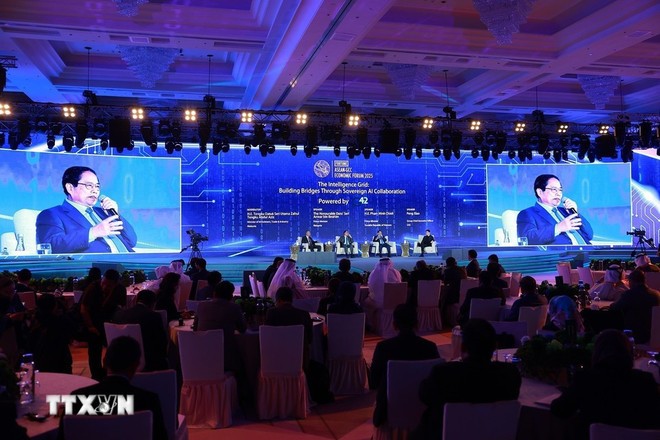.jpg)
Prime Minister Pham Minh Chinh (R) and Malaysian Prime Minister Anwar Ibrahim participate in a high-level discussion session titled “The Intelligence Grid: Building Bridges Through Sovereign AI Collaboration” in Kuala Lumpur on May 28. (Photo: VNA)
The event marked the opening of the Association of Southeast Asian Nations (ASEAN) - the Gulf Cooperation Council (GCC) Economic Forum, setting the direction for collaboration between the ASEAN and GCC.
Leaders of countries, experts, scholars, and business representatives from ASEAN and the GCC explored the development and application of autonomous AI, comprehensive digital transformation, and the role of ASEAN-GCC cooperation in building inclusive digital infrastructure. Discussions also focused on experience sharing, development orientation, and the potential for deeper cooperation and connectivity among nations.

Prime Minister Pham Minh Chinh speaks at a high-level discussion session titled “The Intelligence Grid: Building Bridges Through Sovereign AI Collaboration” in Kuala Lumpur on May 28. (Photo: VNA)
Speaking on AI collaboration between ASEAN and the GCC, PM Pham Minh Chinh said AI is now present in all aspects of life, improving human interaction and enhancing productivity across sectors. Therefore, AI development and application are not only strategic choices but also urgent, top priorities for every country.
According to Chinh, ASEAN and GCC members possess distinct and complementary advantages, highlighting the need for closer and more effective cooperation in all areas. In this effort, governments play an enabling role by developing regulatory frameworks, infrastructure, and human capital, while people and businesses must be the central actors in AI development, application, and governance.
Like humans, AI has both strengths and limitations, the PM stressed, saying what matters is harnessing its positive aspects while minimising risks.
He urged developed nations to support less developed and developing countries in achieving inclusive, comprehensive AI development, ensuring no one is left behind. This includes building conducive legal frameworks, strategic infrastructure, such as data systems, energy, and smart governance; training high-quality human resources, and facilitating ethical AI development. He called for concessional financing and technology transfer from developed countries to those still developing.
Stressing the importance of an intelligent and civilised governance system for AI that adheres to global standards, Chinh called for stronger coordination to ensure AI development is safe, ethical, and inclusive. He highlighted that ASEAN, the GCC, and China can complement and support each other in unlocking unique potential, seizing emerging opportunities, and maximising their respective competitive advantages.

Comment
Print